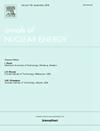非结构几何中SN节点法的粗网格加速方法研究
IF 2.3
3区 工程技术
Q1 NUCLEAR SCIENCE & TECHNOLOGY
引用次数: 0
摘要
带非结构化节点的SN节点法是求解中子输运方程中复杂几何形状建模的有效方法。然而,当采用三角节点进行建模时,会遇到效率瓶颈。在此背景下,研究了基于非结构化粗网格的SN节点法的加速方法,以解决效率问题。为此,本研究首先提出了一种基于任意三角形网格的粗网格生成算法。在此基础上,提出了pCMFD、odCMFD、gCMFD等多种CMFD方案。该方法既可以处理六边形和矩形组合结构几何中的规则三角形网格,也可以处理Delaunay三角剖分法生成的非结构几何中的任意三角形网格。选取了一组具有不同网格数和几何类型的特征值问题,验证了不同加速方案的精度并评价了不同加速方案的性能。结果表明,在不同工况下,加速度比可达2-3。本文章由计算机程序翻译,如有差异,请以英文原文为准。
Investigation of coarse mesh acceleration methods for the SN nodal method in unstructured geometries
The SN nodal method with unstructured nodes is an effective approach for modeling the complicated geometries in solving the neutron transport equation. However, it hits an efficiency bottleneck when triangular nodes are adopted in the modeling. Against this backdrop, this study investigated acceleration methods for the SN nodal method based on unstructured coarse meshes to address the efficiency problem. To achieve this, the study first proposed a coarse mesh generation algorithm from arbitrary triangular meshes. Then, various CMFD schemes, including pCMFD, odCMFD, and gCMFD, were developed. The proposed method can process regular triangular meshes in structured geometries of hexagonal and rectangle assemblies, as well as arbitrary triangular meshes generated in unstructured geometries using the Delaunay triangulation method. A set of eigenvalue problems with various mesh counts and geometry types was selected to verify the accuracy and evaluate the performance of different acceleration schemes. Results indicated that an acceleration ratio of up to 2–3 can be achieved for different conditions.
求助全文
通过发布文献求助,成功后即可免费获取论文全文。
去求助
来源期刊

Annals of Nuclear Energy
工程技术-核科学技术
CiteScore
4.30
自引率
21.10%
发文量
632
审稿时长
7.3 months
期刊介绍:
Annals of Nuclear Energy provides an international medium for the communication of original research, ideas and developments in all areas of the field of nuclear energy science and technology. Its scope embraces nuclear fuel reserves, fuel cycles and cost, materials, processing, system and component technology (fission only), design and optimization, direct conversion of nuclear energy sources, environmental control, reactor physics, heat transfer and fluid dynamics, structural analysis, fuel management, future developments, nuclear fuel and safety, nuclear aerosol, neutron physics, computer technology (both software and hardware), risk assessment, radioactive waste disposal and reactor thermal hydraulics. Papers submitted to Annals need to demonstrate a clear link to nuclear power generation/nuclear engineering. Papers which deal with pure nuclear physics, pure health physics, imaging, or attenuation and shielding properties of concretes and various geological materials are not within the scope of the journal. Also, papers that deal with policy or economics are not within the scope of the journal.
 求助内容:
求助内容: 应助结果提醒方式:
应助结果提醒方式:


